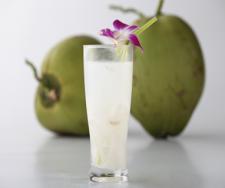-

Coconut water
| Food | Percentage of DRI per 100 grams | |
|---|---|---|
| magnesium | 6 | |
| copper | 5 | |
| vitamin B2 | 4 | |
| vitamin C | 4 | |
| iron | 4 | |
| vitamin B1 | 3 | |
| calcium | 3 | |
| fiber | 3 | |
| manganese | 1 | |
| zinc | 1 | |
Coconut water is actually the juice present inside the interior cavity or endosperm of young, tender coconut. Its water is one of the nature’s most refreshing drinks, consumed worldwide for its nutritious and health benefiting properties.
The water is actually obtained by opening a tender, green, healthy, and undamaged coconut. Inside, it's clear liquid is sweet, and sterile and composed of unique chemicals such as sugars, vitamins, minerals, electrolytes, enzymes, amino acids, cytokine, and phyto-hormones. In general, young and slightly immature coconuts gathered from the coconut tree after they reach about 5-7 months of age for the purpose of reaping its drink.
Botanically, coconut plant belongs to the Arecaceae family of palm trees, and has the scientific name: Cocos nucifera.
Each coconut may contain about 200 to 1000 ml of water depending upon cultivar type and size. Any nuts younger than five months of age tend to be bitter in taste and devoid of nutrients. In contrast, mature coconuts contain less water, and their endosperm thickens quickly into white edible meat (kernel). Coconut milk obtained from the meat, therefore, should not be confused with coconut water.
Coconut palm flourishes well under the costal tropical environments. A coconut tree may yield several hundreds of tender nuts each season. Different species of coconut palms are grown all over the tropics. Naturally, their taste and flavor of water show variations according to saline content in the soil, distance from seashore, climate, etc.
Health benefits of coconut water
Coconut water is a very refreshing drink to beat tropical summer thirst. Its liquid is packed with simple sugars, electrolytes, and minerals to replenish dehydration conditions inside the human body.
Research studies suggest that cytokinins (e.g., kinetin and trans-zeatin) in coconut water found to have significant anti-ageing, anti-carcinogenic, and anti-thrombotic (anti-clot formation) effects.
Coconut water has been generally offered to patients with diarrhea in many tropic regions to replace the fluid loss from the gastrointestinal tract and to reduce the need for hospitalisation. The osmolarity of tender coconut water is slightly greater than that of WHO recommended ORS (Oral Rehydration Therapy) solution. Presence of other biological constituents like amino acids, enzymes, minerals, and fatty acids may account for this higher osmolarity. Nonetheless, unlike WHO-ORS, its water is very low in sodium and chlorides, but rich in sugars and amino acids. This well-balanced fluid composition, along with much-needed calories, would be an ideal drink instead of any other kind of soft drink beverages available in the markets to correct dehydration conditions.
Coconut water is composed of many naturally occurring bioactive enzymes such as acid phosphatase, catalase, dehydrogenase, diastase, peroxidase, RNA-polymerases etc. In effect, these enzymes help in the digestion and metabolism.
Despite being very light in consistency, its water proportionately has better composition of minerals like calcium, iron, manganese, magnesium, and zinc than some of the fruit juices like oranges. (Compare the mineral composition of oranges).
Its liquid is also a very good source of B-complex vitamins such as riboflavin, niacin, thiamin, pyridoxine, and folates. These vitamins are essential in the sense that the human body requires them from external sources to replenish.
Coconut water carries a very good amount of electrolyte potassium. 100 ml of water has 250 mg of potassium and 105 mg of sodium. Together, these electrolytes help replenish electrolyte deficiency in the body due to diarrhea (loose stools).
Further, fresh coconut water has a small amount of vitamin-C (Ascorbic acid); It provides about 2.4 mg or 4% of RDA. Vitamin C is a water-soluble ant-oxidant.